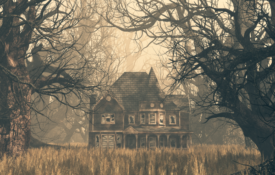-
Forget Halloween. Children Are Frightening Year-Round.
Some parents don’t need spooky stories or horror movies. The real terror already lives within the walls of their homes. To be clear, I’m talking about little children. Kids can be incredibly eerie. They seem innocent but sometimes appear highly sophisticated. And when they communicate, it’s often in such a simple, uninhibited way that many adults find it unnerving. Especially when their children are talking about something unpleasant. ...
-

Playing With Fear: Haunted Houses and Recreation
Haunted houses, horror movies, and ghost stories can provoke chilling delights, provided the fear they evoke remains in a “Goldilocks zone” that is neither too terrifying nor too tame. New research connects this sweet spot
-

Path to My Postdoc: Creating Collaborative Connections
Researchers shared their experiences with the postdoctoral process, including applications, securing funding, and the value of publications.
-

Haunted House Researchers Investigate the Mystery of Playing With Fear
New research connects a sweet spot of recreational fear to a telltale range of heart rate fluctuations, shedding light on the mind-body connection between fear and fun.
-

New Research in Psychological Science
A sample of research on how trust may increase exposure to infection, wisdom of the crowd, aging and memory for distractors, social distancing motivated by empathy, using fake-news to enhance memory for facts, children’s cognitive reflection and understanding of science, and choice-induced preference in infancy.
-
Three Trouble Spots Facing Women in Science—and How We Can Tackle Them
APS Member/Author: Leah H. Somerville Women are pursuing careers in science at rates never seen before, and this growing representation of female voices is truly exciting. Yet we are well aware that the academic community has not solved all the problems facing women. That’s why we’re using this column to highlight three challenges that we see as particularly relevant across the sciences—and what we as an academic community can do about them. This is based on a paper June co-authored with more than 50 of her psychology colleagues listing trouble spots that continue to hinder the advancement of women in their field.

